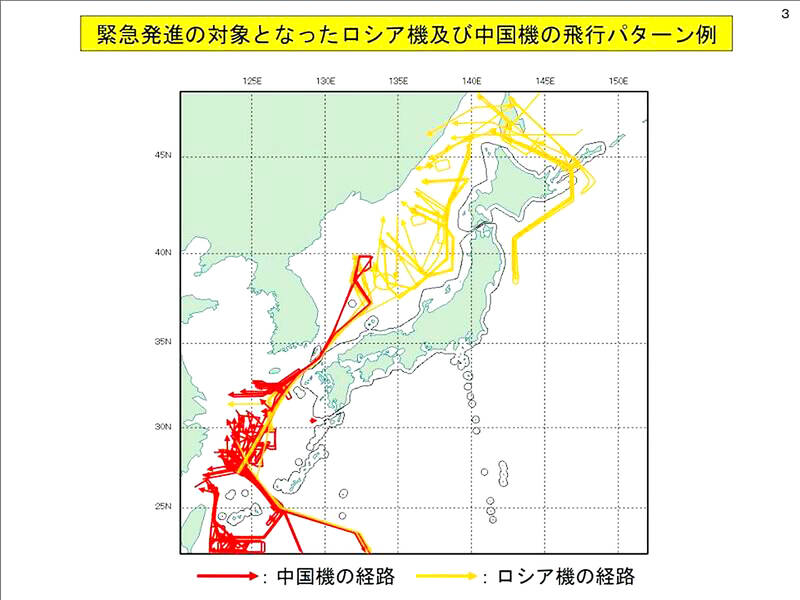Frequent harassment by Chinese and Russian warplanes has disturbed flight security in East Asia and destabilized geopolitics in the western Pacific region, the Japanese Ministry of Defense said.
From April to December last year, the Japan Air Self-defense Force scrambled fighter jets 555 times to intercept foreign military planes, mainly from China and Russia, the ministry said in a report.
Most of the intercepts occurred in Japan’s air defense identification zone (ADIZ) to the southwest.

Photo: Screen grab from a Japanese Ministry of Defense report
Of the 555 launches, 392, or 71 percent, were scrambled to intercept Chinese jets, and 148, or 24 percent, were to stop Russian jets.
The remaining 15 were made in response to aircraft from North Korea, Taiwan and other countries.
Japan’s southwestern ADIZ saw the majority of Chinese plane incursions at 327, or 58.9 percent, followed by the west at 97, the north at 94 and its central air space at 37, the report said.
The frequency of Chinese jet harassment near the Taiwan Strait and Japan’s southwestern ADIZ has decreased flight safety in the region, it said.
The Chinese warplanes included J-15 and J-16 jets, H-6 bombers, Y-9DZ electronic intelligence aircraft and BZK-005 uncrewed aerial vehicles, while Russian planes included Tu-95 bombers, IL-20 surveillance aircraft and IL-38 anti-submarine aircraft, the report said.
While the number of scrambled sorties dropped by 57 compared with the same period in 2022, reports from the US Naval Institute said that the region averages two scrambled launches a day and remains under high alert.
Two Russian-Chinese military exercises in the region involving long-range bombers, landing and take-off exercises on the Chinese People’s Liberation Army Navy Shandong carrier, and North Korean trial launches of intercontinental ballistic missiles are clear signals that Japan is facing severe external threats, the report added.

Trips for more than 100,000 international and domestic air travelers could be disrupted as China launches a military exercise around Taiwan today, Taiwan’s Civil Aviation Administration (CAA) said yesterday. The exercise could affect nearly 900 flights scheduled to enter the Taipei Flight Information Region (FIR) during the exercise window, it added. A notice issued by the Chinese Civil Aviation Administration showed there would be seven temporary zones around the Taiwan Strait which would be used for live-fire exercises, lasting from 8am to 6pm today. All aircraft are prohibited from entering during exercise, it says. Taipei FIR has 14 international air routes and

The Ministry of National Defense (MND) today released images of the military tracking China’s People's Liberation Army (PLA) movements during the latest round of Chinese drills around Taiwan. The PLA began "Justice Mission 2025" drills today, carrying out live-fire drills, simulated strikes on land and maritime targets, and exercises to blockade the nation's main ports. The exercises are to continue tomorrow, with the PLA announcing sea and air space restrictions for five zones around Taiwan for 10 hours starting from 8:30am. The ministry today released images showing a Chinese J-16 fighter jet tracked by a F-16V Block 20 jet and the

Taiwan lacks effective and cost-efficient armaments to intercept rockets, making the planned “T-Dome” interception system necessary, two experts said on Tuesday. The concerns were raised after China’s military fired two waves of rockets during live-fire drills around Taiwan on Tuesday, part of two-day exercises code-named “Justice Mission 2025.” The first wave involved 17 rockets launched at 9am from Pingtan in China’s Fujian Province, according to Lieutenant General Hsieh Jih-sheng (謝日升) of the Office of the Deputy Chief of the General Staff for Intelligence at the Ministry of National Defense. Those rockets landed 70 nautical miles (129.6km) northeast of Keelung without flying over Taiwan,

City buses in Taipei and New Taipei City, as well as the Taipei MRT, would on Saturday begin accepting QR code payments from five electronic payment providers, the Taipei Department of Transportation said yesterday. The new option would allow passengers to use the “transportation QR code” feature from EasyWallet, iPass Money, iCash Pay, Jkopay or PXPay Plus. Passengers should open their preferred electronic payment app, select the “transportation code” — not the regular payment code — unlock it, and scan the code at ticket readers or gates, General Planning Division Director-General Liu Kuo-chu (劉國著) said. People should move through the